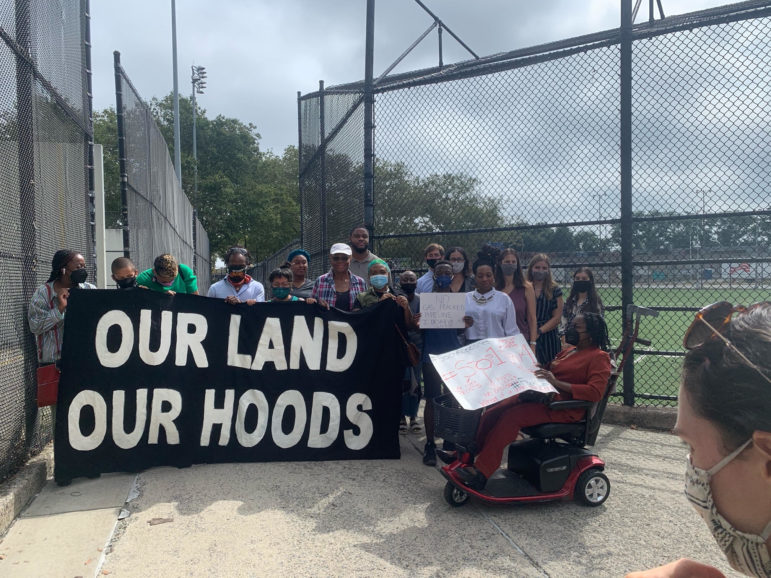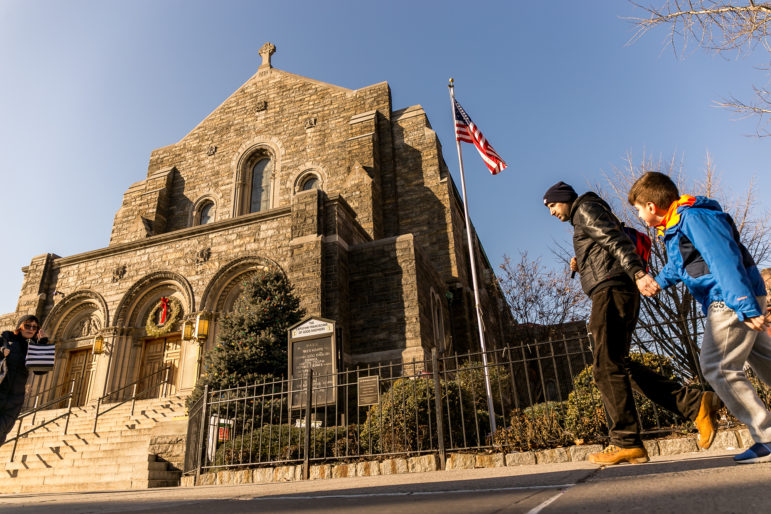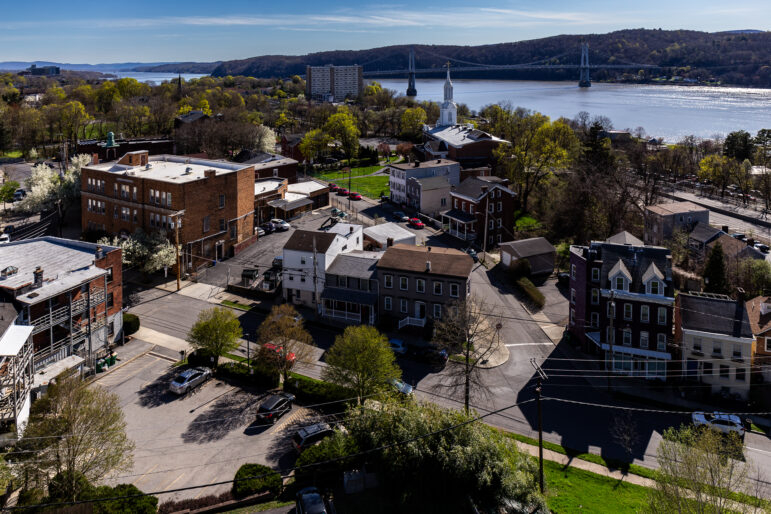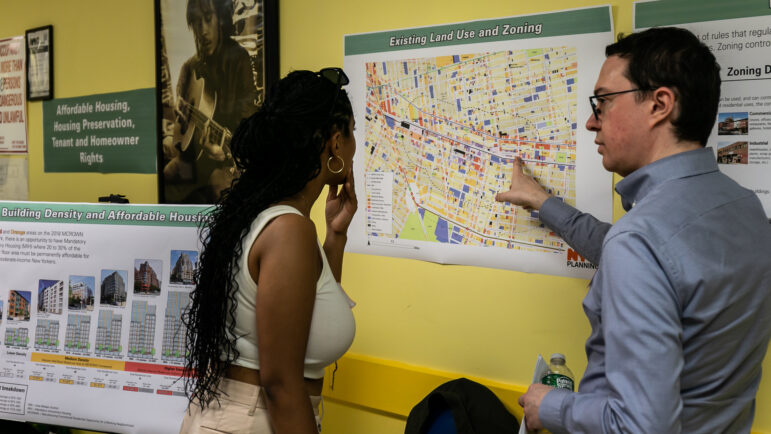“Despite being the first phase of the pipeline’s construction, Brownsville and Ocean Hill were the last to find out about it,” said civil rights attorney Britney Wilson.

Courtesy NYLS
Residents and environmentalists announcing their civil rights complaint against the pipeline project on Monday.Residents of Brooklyn filed a federal civil rights complaint Monday against National Grid and multiple New York government agencies related to the North Brooklyn Pipeline Project, alleging construction of the controversial fracked gas pipeline disproportionately impacts communities of color.
The complaint, filed Monday by the Civil Rights and Disability Justice Clinic at New York Law School and the National Center for Law and Economic Justice, argues the project specifically violates Title VI of the federal Civil Rights Act of 1964, which prohibits entities that receive federal funding from discriminating based on race.
It accuses National Grid and the state’s Department of Public Service (DPS), which oversees utility services and approved a rate increase last month for National Grid customers in areas served by the new pipeline, of “bypassing federal and state environmental and pipeline safety laws” in carrying out the project in predominantly Black and Latinx communities without an adequate assessment of how it would affect those residents.
The complaint seeks to “immediately stop the flow of gas, rescind its approval of the rate hike, and analyze the disproportionate impact of the pipeline and rate hike on Black and Latinx individuals.” It alleges that National Grid “evaded public hearings and disguised the nature of its construction work so that community members did not learn of the pipeline until it was nearly complete,” citing multiple people who live nearby but say they only learned of the project when they were contacted by activists seeking to protest it.
“We want to show you the faces of communities that are disproportionately affected by this,” said civil rights attorney Britney Wilson at a press conference in Brownsville Monday morning. “Despite being the first phase of the pipeline’s construction, Brownsville and Ocean Hill were the last to find out about it.”
National Grid began construction of the five-phase, seven-mile fracked-gas pipeline in 2019, sparking protests by residents and government officials, including City Comptroller Scott Stringer and Mayor Bill de Blasio. One of the residents quoted in Monday’s complaint, Pati Rodriguez, even chained herself to the construction site.
In May, National Grid and DPS reached a joint settlement that mandated the company halt construction on the pipeline until it gets further approvals by DPS involving review by an independent party.
But by that time, four of the five sections had been completed and were already transporting gas through Brownsville, Ocean Hill, Bushwick, East Williamsburg and Williamsburg, where the collective population is 44.3 percent Black and 39.3 percent Latinx, the civil rights complaint notes. It also claims National Grid did not follow through with certain public service requirements, including testing pressure on the pipes, submitting mapping data for inclusion on the National Pipeline Mapping System, and filing an operating and maintenance plan.
The complainants—which include Brownsville Green Justice, the Ocean Hill-Brownsville Coalition of Young Professionals, Mi Casa Resiste and the Indigenous Kinship Collective—note that although the project was stopped before it could be completed, the last and only section yet to be built runs through the majority-white neighborhood of Greenpoint.
“DPS staff went so far as to deny that the North Brooklyn Pipeline disproportionately burdens disadvantaged communities, even though the pipeline exclusively runs through disadvantaged communities—except for the segment DPS put on hold,” the complaint says.
DPS disputed the complaint’s assertions.
“As demonstrated by its numerous programs and initiatives, the Department of Public Service is 100 percent committed to environmental justice, promoting community equity, and minimizing community siting impacts to the fullest extent possible,” DPS told City Limits in a statement. “All permitting entities, including New York City, determined the pipeline project complied with all applicable laws and regulations.”
The complaint also alleges that the state Department of Environmental Conservation (DEC) failed to fully assess the environmental impact of the pipeline when it determined that a portion of the project did not require a full environmental review or public hearings, as required by a 2003 regulation to incorporate environmental justice concerns into DEC permit planning.
A spokesperson for the DEC refuted this allegation.
“DEC subjects all applications for environmental permits to a transparent and rigorous review process that encourages public input at every step and includes review of all public comments,” he told City Limits.
“DEC also carefully reviews all applicable federal and state standards to ensure the agency’s decision is protective of public health and the environment, upholds environmental justice and fairness, and meets the applicable standards, including those related to the Climate Leadership and Community Protection Act (CLCPA),” the spokesperson continued, referring to the state’s major climate law. The agency declined further comment, as the matter is subject to potential litigation.
Critics of the pipeline point to more than 22,000 leaks in National Grid’s pipes since 2016, with more than 1,900 still unfixed in 2020, as shown on the company’s “Year-End Leak Report” from January 2021.
Activists say that hazardous environmental infrastructure—power plants and pipelines—put their communities at a greater risk of health problems like asthma, and further fuels health disparities across neighborhoods.
Residents of Brownsville, for instance, have some of the highest rates of asthma in the city and a life expectancy of 75 years, compared with nearly 86 years for residents of the Upper East Side, according to the city’s community health profiles.
“The sad reality is that this type of environmental racism has been going on for years,” said Celina Trowel, of the Ocean Hill-Brownsville Coalition. “It’s part of why we already have the worst public health outcomes than any other parts of the city.”
National Grid did not immediately respond to a request for comment. The company has previously said the Brooklyn pipeline project is needed to ensure reliable gas service to its downstate customers.
Liz Donovan is a Report for America corps member.










One thought on “Brooklyn Pipeline Project Violates Civil Rights Law, Residents and Environmentalists Allege”
Brooklyn Union Gas – today National Grid had a tremendous commitment to quality of life issues in Brooklyn, Queens, Staten Island for decades.
The BUG “Cinderella Program” had been the beginning of the resurgence of Park Slope in the 1970s.
Documented corporate philanthropy BUG supported all kinds of efforts to improve economic development and quality of life to offset the sting of high gas bills, etc.
Today National Grid does NOT have the commitment to community relations that BUG had for decades.
And so the community does NOT support this project.